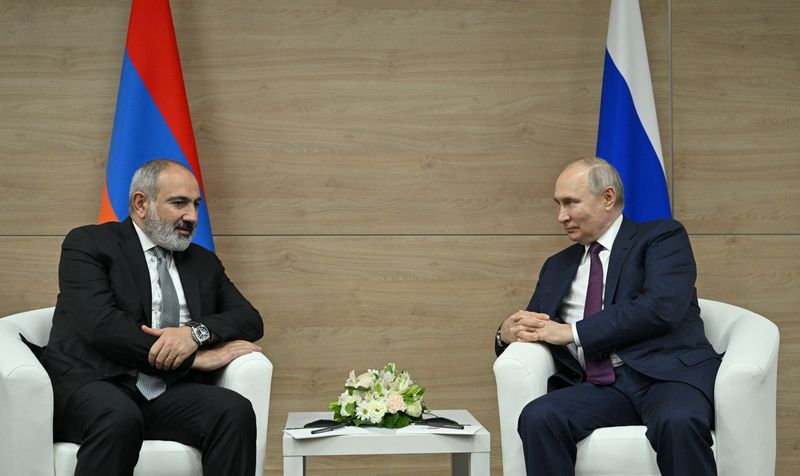Russia’s rift with old ally Armenia deepens doubts about its clout in ex-USSR
2023.09.12 08:08

© Reuters. FILE PHOTO: Russian President Vladimir Putin meets with Armenian Prime Minister Nikol Pashinyan in Sochi, Russia June 9, 2023. Host photo agency/Ramil Sitdikov via REUTERS
By Andrew Osborn
LONDON (Reuters) – A public falling-out between Russia and Armenia, one of its oldest and closest allies, is deepening doubts about Moscow’s ability to maintain and project power across parts of the former Soviet Union when it is focused on waging war in Ukraine.
Armenia hosts a Russian military base and is Moscow’s only strategic ally in the volatile South Caucasus, a region crisscrossed with oil and gas pipelines.
Ties have warmed and cooled over the years, but in recent weeks, Armenia has in effect declared it has no confidence in Russia’s ability to protect it under a defence pact and sought other partners as strains escalate with neighbouring Azerbaijan, against which it lost a short war in 2020.
Russia’s perceived absence could open the door for other players – be it Turkey, Azerbaijan, Iran, China or the West – to try to take its place in the South Caucasus or other ex-Soviet territories it openly considers its sphere of influence.
“Russia’s abject performance in Ukraine has left former clients looking for other more dependable protectors,” said Anthony Brenton, former British ambassador to Russia.
“I am sure they (the Russians) will do what they can to reassure others (notably Syria) of their continuing support.”
Armenia says, for example, that Russia cannot provide the weapons it has traditionally supplied because it needs them for Ukraine, and so Yerevan has turned to India instead.
While pointedly refusing to allow a Russian-led military bloc to hold manoeuvres on Armenian soil, Prime Minister Nikol Pashinyan this week authorised the hosting of a rare joint exercise with the United States, Ukraine’s biggest backer.
“Russia is now distracted and doesn’t want to get involved in any other problem or crisis other than Ukraine,” said Olesya Vartanyan, senior South Caucasus analyst at International Crisis Group (ICG), a conflict prevention organisation.
“Russian officials have been telling their Armenian counterparts: ‘Please wait, we’re busy with the war in Ukraine’.”
She questioned what resources Moscow had to tackle other problems if it was unable to repair relations with Armenia, its sole strategic partner in the region.
Ties with energy-rich Kazakhstan, which has refused to back Russia’s “special military operation” in Ukraine, have also cooled. Moldova had to cope with a huge influx of refugees from the war in Ukraine and has a pro-Western government trying to cut its dependency on Moscow.
The situation in Georgia, a fifth of which is garrisoned with Russian troops supporting breakaway territories after a war in 2008, is more nuanced; the authorities take some decisions favourable to Moscow even as some voters strongly object.
RUSSIA FORGES NEW ALLIANCES
But others have come closer.
Belarus, whose authoritarian president Alexander Lukashenko meets Russian President Vladimir Putin several times a year, became a launch pad for the invasion in 2022, and now hosts Russian tactical nuclear missiles.
Iran’s sale of drones to Russia has further cemented relations, and North Korean leader Kim Jong Un is due for talks in Russia this week.
Ties with India, Brazil and South Africa remain strong, but Moscow looks like the junior partner in a burgeoning ‘no limits’ partnership with China that has allowed Beijing, at steep discounts, to buy oil and gas that Russia can no longer sell to the West.
How Russia deals with Armenia is likely to be watched closely.
Pashinyan has publicly questioned the will and ability of Russian peacekeepers to lift a nine-month de facto Azerbaijani blockade of the ethnic Armenian-populated Nagorno-Karabakh enclave and lamented the “mistake” of relying solely on Moscow for security.
ICG’s Vartanyan said Yerevan fretted that Azerbaijan might use Moscow’s perceived weakness to seize control of territory, notably in the enclave.
“Armenian officials were saying in the summer that, by the time Russia has time to help us, there will be no country left to help,” she said. “They are in crisis mode.”
Moscow accused Pashinyan of behaviour bordering on insolence, and on Friday summoned Armenia’s ambassador to protest against “hostile steps”.
Armenia’s move to fully sign up to the International Criminal Court (ICC) – because it wants to bring war crimes charges against Azerbaijan – is another source of tension. The ICC has issued an arrest warrant for Putin on war crimes charges, so the step raises the prospect that he may not be able to visit a close ally.
Pashinyan, who has called the ICC move an “unfortunate coincidence” in the context of Russia, has also defended his wife’s recent delivery of aid to Ukraine.
An unnamed Russian diplomat accused Pashinyan, via the state news agency TASS, of acting like a tool of the West in trying to push Russia out of the South Caucasus.
Putin on Tuesday played down the rift though, saying he did not think Yerevan had turned its back on Moscow, while accusing it of rejecting Russian proposals for peace with Azerbaijan.
Kremlin spokesman Dmitry Peskov said last week that Russia “plays a consistent, very important role in stabilising the situation in this region”, and was not going anywhere.








